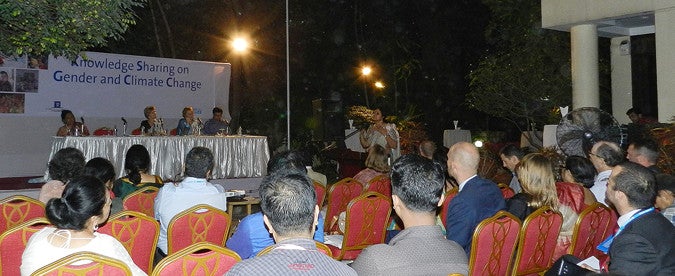Putting women at the center of climate change adaptation and disaster response
Date:
Author: Kausik Das
Dhaka, Bangladesh – Although women are more vulnerable to climate change and disasters when compared to men, the issue remains ignored. This and other facts were discussed on a knowledge-sharing event on Gender and Climate Change conducted last November by UN Women Bangladesh with support from the Royal Norwegian Embassy in Dhaka.

The purpose of the event was to disseminate key findings of some of the critical researches done under the project entitled 'Reducing Vulnerability of Women Affected by Climate Change through Viable Livelihood Options’ including overall results achieved and lessons learnt.
The studies provide operational recommendations for policy-makers and key stakeholders to ensure climate change adaptation and disaster risk reduction initiatives address prevailing gender inequalities in households and communities to lessen women’s vulnerability. It is expected that these findings will assist to establish a more gender-responsive climate change planning and programming in Bangladesh.
The knowledge-sharing event was kick-started by H.E. Ms. Merete Lundemo, Ambassador for The Royal Norwegian Embassy in Dhaka who delivered welcoming remarks. Ms. Sharmind Neelormi, Professor at Jahangirnagar University and Mr. Golam Rabbani from the Bangladesh Center for Advanced Studies (BCAS) presented key findings from the studies while Ms. Dilruba Haider, UN Women Gender and Climate Change Coordinator, touched upon on the results achieved and the way forward. Eminent experts Ms. Rokeya Kabir, from the Bangladesh Nari Progati Sangha (BNPS) and Dr. Dwijen Mallick from BCAS spoke as panel discussants. The discussions were moderated by Ms. Christine Hunter, UN Women Representative.
The event, held a few days ahead of the United Nations Conference on Climate Change (COP21) celebrated in Paris, saw the participation of Government officials, UN agencies, International and national non-governmental organizations, universities, research institutions and other development partners.
For more information please contact:
Kausik Das
Monitoring and Communication Officer
UN Women Bangladesh
Email: [ Click to reveal ]